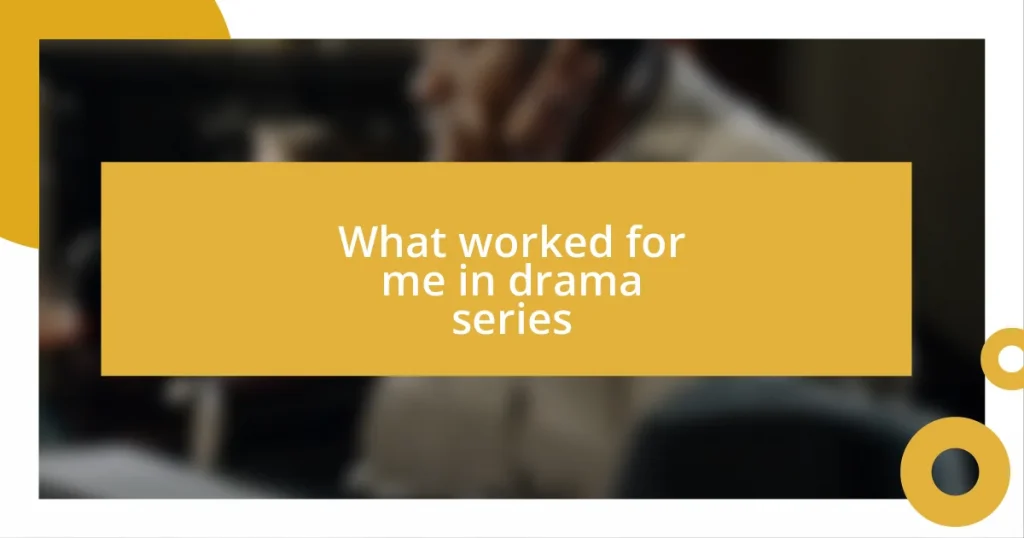Key takeaways:
- Character development in dramas often evokes real emotions, prompting personal reflection on moral dilemmas and societal judgments.
- Relatable traits and shared struggles in characters strengthen the viewer’s emotional connections, encouraging introspection about personal insecurities and relationships.
- Engagement with character journeys fosters empathy, revealing parallels between on-screen narratives and the viewer’s own experiences, inspiring personal growth and self-discovery.
Understanding character development
Character development is the backbone of any compelling drama, and I often find myself leaning into the nuances that make these characters feel real. Think about those moments when a character faces a moral dilemma—it’s fascinating how their choices reveal their true selves. Have you ever paused to consider how those decisions reflect struggles we all face in our own lives?
I vividly remember watching a series where a seemingly shallow character went through a transformation after experiencing loss. At first, I found it hard to connect with her, but as the layers peeled away, her vulnerabilities resonated deeply with me. It made me reflect: how often do we misjudge people based on surface appearances?
In my experience, truly understanding a character requires patience and empathy. The deeper we dive into their backgrounds and motivations, the more we unveil the complexities of the human experience. Isn’t it incredible how a well-written character can evoke such strong feelings within us, making us reassess our perspectives and beliefs?
Exploring relatable traits
When I watch dramas, it’s the relatable traits of the characters that truly draw me in. I find it intriguing how quirks like clumsiness or a penchant for self-doubt can create a tangible link between me and the on-screen personas. For instance, there was a time I was riveted by a character who struggled with imposter syndrome—her internal battles echoed my own insecurities in professional settings. It felt as if she was sharing my struggle, allowing me to connect with her on a personal level.
- Characters who show vulnerability make them feel authentic.
- A character’s flaws, like poor communication, often mirror our own.
- Stories of resilience can inspire hope during tough times.
- Quirky hobbies or interests make them more relatable and endearing.
- Moments of failure serve as reminders of our shared humanity.
Analyzing emotional connections
When examining emotional connections with characters, I often find that it’s their struggles that resonate most deeply with me. For instance, I once watched a drama where a character dealt with heartbreak, painting a vivid picture of grief and longing. I could relate to those feelings, reminding me of my own experiences of loss, and I felt a sense of companionship with her. There’s something profoundly human in witnessing another’s pain.
Emotionally charged scenes can sometimes leave me breathless. I remember a particular moment in a series where a character had to confront their childhood fears. As I watched, I realized how my heart raced with theirs, reflecting a personal confrontation with my own past insecurities. These shared emotional experiences forge a powerful bond that transports me into their world.
Ultimately, it’s about the depth of emotion portrayed and how it mirrors our realities. I perceive emotional intelligence in the way characters navigate their relationships—how they love, lose, and grow. During a poignant scene where a character reconciled with an estranged parent, I found myself reflecting on my family dynamics, reinforcing the idea that a well-crafted narrative can provoke introspection, strengthening my connection to the characters.
| Emotional Connection Aspect | Impact on Viewer |
|---|---|
| Character struggles | Creates empathy and personal reflection |
| Emotionally charged scenes | Enhances engagement and shared feelings |
| Depth of relationships | Encourages introspection and relatability |
Engaging with character journeys
I find that engaging with character journeys often involves witnessing their growth over time. Take, for example, a series where a character evolves from selfishness to selflessness. I can still remember the moment she chose to help someone in need instead of focusing on her own goals. It made me reflect on my personal journey—have I ever been too absorbed in my own life to notice others around me? Watching her transformation sparked a desire in me to embrace that same empathy in my day-to-day life.
There’s something magnetic about the challenges characters face and how they overcome them. I can think of a time when a protagonist struggled with self-doubt through a series of obstacles. As she fought to reclaim her confidence, I felt her victories like my own. Those small triumphs often resonate deeply, reminding me of my own struggles and the determination I’ve had to muster in difficult moments. It’s almost as if their journey becomes my inspiration, motivating me to tackle my own challenges with a renewed perspective.
What truly captivates me, however, is when a character’s journey mirrors broader themes of growth and resilience. I remember being struck by a character who, despite numerous failures, kept pursuing his dream of becoming an artist. This journey made me ponder—what dreams am I neglecting because of fear? I realized that in celebrating his resilience, I wasn’t just engaging with a story; I was inviting reflection on my aspirations and the courage needed to chase them despite setbacks. That’s the beauty of diving into character journeys—they offer not just narratives but invitations to explore our own lives.
Reflecting on personal experiences
Reflecting on personal experiences is incredibly enlightening for me. I recall a time when I watched a drama where the main character experienced a significant life change—losing a job they loved. This scenario struck a chord with me, as I faced a similar uncertainty in my own career. Watching her navigate through despair and eventually find resilience encouraged me to reassess my situation and seek new paths. Isn’t it fascinating how we can draw strength from someone else’s fictional journey?
In another instance, I connected deeply with a character who struggled with feeling out of place. I remember feeling that way during a difficult transition in my life, where I wasn’t sure where I fit in. As I watched her embrace her uniqueness and find comfort in her distinctiveness, I felt a wave of validation wash over me. It made me ponder how often we shy away from our true selves due to societal pressures. I found myself asking, “How can I celebrate my differences instead of hiding them?”
There’s also a drama that features a character dealing with estrangement from her best friend. Reflecting on that relationship echoing my own experiences of drifting apart from close friends helped me understand the fragility of connections. It made me consider—what steps can I take to mend such relationships? Her journey through regret and reconciliation sparked a determination in me to reach out to the friends I’ve lost touch with. In this way, the characters not only mirror my life experiences but also encourage proactive introspection.
Practicing empathy through narratives
When I immerse myself in narratives, I notice how they invite me to step into the shoes of different characters and experience their emotions as if they were my own. I remember watching a drama where a character faced immense loss, and I felt their grief weighing on my heart. This powerful connection made me contemplate my own experiences with loss—how did those moments shape my understanding of empathy and connection with others around me?
Through these stories, I’m often challenged to confront my biases and judgments. I once watched a character whose actions were initially hard for me to understand; she made decisions that seemed cruel at first. However, as the story unfolded, I learned about her painful backstory, which transformed my perception entirely. It raised a question for me: how often do we judge others without knowing their stories? This awareness not only made me more empathetic but also encouraged me to approach real-life situations with an open mind.
I find that as I follow characters on their journeys, their struggles often trigger deep reflections within me. Recently, a storyline revolved around a character grappling with anxiety, something I’ve dealt with myself. Seeing her articulate her fears gave me the courage to acknowledge my own challenges. I often ask myself, “If she can confront her vulnerability, what’s stopping me?” It’s like these narratives act as mirrors, guiding me to explore both my vulnerabilities and the strength that can emerge from accepting them.
Discussing implications on viewer experiences
When I delve into a drama, I often find that the characters’ choices resonate with my own thoughts and feelings. There was a time when I watched a story about a character torn between loyalty and personal ambition. As I navigated my own career decisions, I found myself questioning, “What would I prioritize in her situation?” This reflection not only deepened my connection with her but also forced me to confront my own values and choices in a way that felt both uncomfortable and enlightening.
The emotional rollercoaster that these narratives offer can profoundly shape my viewing experience. Just last month, I came across a scene where a character had to make a heart-wrenching sacrifice for someone she loved. That moment hit home for me, reminding me of sacrifices I’ve made for loved ones. It made me wonder—how do we balance our needs with the demands of others? In grappling with this question, I’ve begun to recognize the nuances of love and responsibility in my own relationships, which ultimately heightens the emotional stakes for me as a viewer.
Interestingly, there are moments when I feel the weight of societal expectations reflected in characters’ struggles. In one drama, I observed a character battling the pressure to conform to traditional beliefs while yearning for independence. Her conflict echoed my own past experiences, leading me to think, “How often do I allow others’ expectations to dictate my choices?” This realization not only deepened my appreciation for her journey but also impelled me to take a stand for my own beliefs and aspirations. The implications are clear: these characters illuminate my path of self-discovery, making the viewing experience a powerful catalyst for personal growth.












